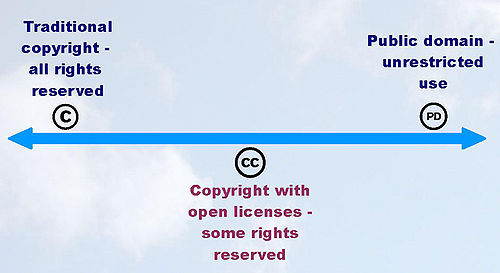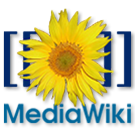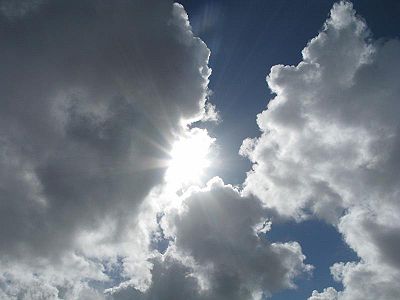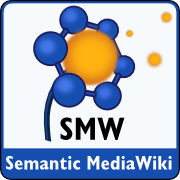Practical Semantic Mediawiki: Difference between revisions
| Line 86: | Line 86: | ||
* <nowiki>{{My Template}}</nowiki> — A template (reusable content, function or variable) — Don't Repeat Yourself | * <nowiki>{{My Template}}</nowiki> — A template (reusable content, function or variable) — Don't Repeat Yourself | ||
** Pipe symbol is used to pass parameters — <nowiki>{{Show Something|Something}}</nowiki> | ** Pipe symbol is used to pass parameters — <nowiki>{{Show Something|Something}}</nowiki> | ||
* <nowiki>{{{}}}</nowiki> — SMW variable | * <nowiki>{{{1}}}</nowiki> — SMW variable, in this case the first value passed to a template | ||
* Proactive linking | * Proactive linking | ||
Revision as of 15:56, 25 November 2010
This hands-on session for non technical users emphasizes the "need to know" aspects of Web publishing, wikis, information design and Semantic Mediawiki.
Acronyms
- SMW = Semantic Mediawiki
- MW = Mediawiki
- CC = Creative Commons
Web publishing
Access models
- Fully open, no login required
- Require login for editing
- Require created accounts to edit (closed editing)
- Require created accounts to access (fully private)
- Encryption to avoid snooping
Access models can be changed over time; avoid starting a wiki with jargon or unsympathetic content.
Site users
- Levels
- De-emphasize control, make it as flat as possible
- Bureaucrats still exist
- OpenID signin
Accessibility
Here, accessibility refers to supporting people with vision, keyboard control or cognitive difficulties.
- Making sites accessible generally increases usability
- Works on more devices from text browser to handheld
- Typically more straightforward navigation
- Accessible hot keys can be used by any expert user
- The curb cuts principle
- Mediawiki is accessible, SMW has issues (forms)
- Value content over appearance
- Good tags for images, image maps
Terms of use
- Creative Commons - share with options for attribution, non-commercial, changes
- Traditional copyright - by permission only
- Re-using content
Using Mediawiki
Mediawiki is the underlying software of Wikipedia. It is robust, supported by a large community and supports hundreds of useful extensions.
Creating pages
- How to name pages
- One topic per page
- Short, avoid special symbols, sentence form
- Code and matching brackets
Basic markup
Rather than using a rich text editor, Mediawiki uses a progressively learned set of markup, that's designed to be human-readable, consistent and enforces meaning over appearance. It's not dependant on special programs, and could be carved into a park bench and retain its meaning.
- ''Italic'', '''Bold'''
- * List heading level one — use # for numbered list
- ** List level two — ## for numbered list
- ...
- ** List level two — ## for numbered list
- =Heading one=
- ==Heading two==
- ...
- ==Heading two==
- [[Mypage]] — A wiki link
- [[File:Mypicture.png]] — Media (inline or link)
- [[Mypage|This is my page]] Alternate link text (using pipe symbol)
- [http://theirsite.com] — A non-wiki link
- Use a space after the link to use your own link text. [http://theirsite.com Their site].
- {{My Template}} — A template (reusable content, function or variable) — Don't Repeat Yourself
- Pipe symbol is used to pass parameters — {{Show Something|Something}}
- {{{1}}} — SMW variable, in this case the first value passed to a template
- Proactive linking
- Brainstorm using links
- Categories
- Subcategories
- Uploading images and files
- Moving pages
- Deleting pages
- Templates - used for consistently reused content
Making pages look good
CSS is the style system of Web pages and can also be used in Mediawiki. Like wiki markup, learning can be progressive.
Placeography | Biofuel Visions
- Re-using CSS styling <div style="background: orange">Hello world</div>
- Avoid losing meaning (don't use <big> for headers), keep it simple
- Re-using styles MediaWiki:Common.css
- Hiding MW's menus and changing the 'skin'
Semantic Mediawiki
SMW is an extension ecology of MW that allows marking up content for re-use and create easier to use forms and views.
- Meaning through annotations and relationships
- Triples
- What properties does your content need to be useful?
Inline property annotation
Single instances of data can be marked-up using annotations.
[[Date::Jan 1, 2011]]
- Built-in types
- Geographic coordinate
- Viewing all properties
- Subtypes
- Queries
Classes
- Creating a class (template, properties, forms)
- One topic per page
- Formlink {{#formlink:Comment|comment||Comment[Topic]={{PAGENAME}}}}</formlink>
Views
Basic inference
Future directions
- Relating ontologies
- Reusing content
- Creating a big picture where anyone can ask questions and add their data
Mediawiki Widgets
Mediawiki Widgets allow embedding third-party site content for rich media (Youtube, photo sites, etc) and interactive discussions (DISQUS, Twitter, etc) without needing to set it up or host it on your site.
- DISQUS discussion
- Register with DISQUS
- Get key
- Create widget
- Embed widget on pages
Converting content or sites
- Pandoc
- Convertors for Open Office, Microsoft Word
Hosting
- Export a site, modularize by category
- Complete site export
- Special:Version
- Free light/startup hosting
- Inexpensive Mediawiki with SMW option
- Wikia
- Self-hosting



